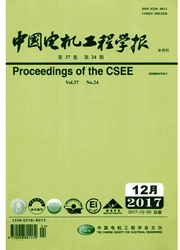

 中文摘要:
中文摘要:
为优化电动汽车(electric vehicle,EV)充电方案,降低充电成本,在机组组合模型(unit commitment,UC)的基础上,提出了电动汽车最优充电模型。针对该模型,提出基于最小边际成本的近似求解算法,根据UC结果计算各调度时段的边际发电成本,优先调度EV在平均边际发电成本最小的区间充电。若现有开机机组不能满足EV的充电需求,则按照新增发电成本最低的原则优先开启满负荷状态下平均耗费最低的机组。以上过程迭代进行,直至所有EV充电完毕。仿真结果验证了该模型及求解算法的有效性,此外,算例分析表明,EV平均充电成本随EV渗透率的提高而增加,且快充模式对应的充电成本最低。
 英文摘要:
英文摘要:
To optimize electric vehicle(EV) charging schedule and minimize charging costs, a formulation was presented on the basis of unit commitment(UC) results. An approximate algorithm based on minimum marginal cost was proposed to solve the formulation. Hourly marginal generation cost was calculated based on the UC results, and EVs were dispatched to be charged over the period with the minimum average marginal generation costs in priority. If present committed units failed to charge all EVs, extra units should be started for charging EVs in ascending order of unit average full-load cost(AFLC) for minimizing extra generation costs due to the newly started unit. The process described above was repeated until all EVs were scheduled. Simulation results validate the proposed methodology. The simulation results demonstrate that EV average charging cost increases with EV penetration level and the charging cost of fast charging mode is minimum.
 同期刊论文项目
同期刊论文项目
 同项目期刊论文
同项目期刊论文
 期刊信息
期刊信息
